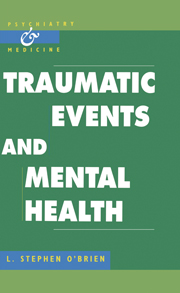Book contents
- Frontmatter
- Contents
- Foreword
- 1 Introduction and historical perspective
- 2 Normal reactions to trauma
- 3 Epidemiology of post-traumatic stress disorder and post-traumatic illness
- 4 Aetiology and predisposing factors
- 5 What constitutes a stressor?
- 6 Post-traumatic illness other than post-traumatic stress disorder
- 7 Diagnosis and assessment
- 8 Management and outcome of post-traumatic illness
- 9 Medicolegal aspects of post-traumatic illness
- 10 Prevention of post-traumatic illness
- 11 The way ahead – whither now?
- Index
6 - Post-traumatic illness other than post-traumatic stress disorder
Published online by Cambridge University Press: 05 May 2010
- Frontmatter
- Contents
- Foreword
- 1 Introduction and historical perspective
- 2 Normal reactions to trauma
- 3 Epidemiology of post-traumatic stress disorder and post-traumatic illness
- 4 Aetiology and predisposing factors
- 5 What constitutes a stressor?
- 6 Post-traumatic illness other than post-traumatic stress disorder
- 7 Diagnosis and assessment
- 8 Management and outcome of post-traumatic illness
- 9 Medicolegal aspects of post-traumatic illness
- 10 Prevention of post-traumatic illness
- 11 The way ahead – whither now?
- Index
Summary
It is the author's contention that this chapter is of great importance. With no apologies for repetition, it is emphasised that:
not everyone who is exposed to trauma develops post-traumatic illness
not all post-traumatic illness is post-traumatic stress disorder.
Although the term PTSD was put forward only in the late seventies and confirmed in 1980, there is no suggestion that the concept that exposure to major trauma can cause mental illness is new. It has long been recognised that trauma can be followed by mental illness. In an editorial addressing a different aspect of controversy surrounding PTSD, Andreasen (1995) reminds us that there was recognition of PTI in DSM-I but that at that time it was ‘conceptualised and defined psychologically’, that it was seen as being ‘by definition acute and reversible’ as it was included in ‘transient situational personality disorders’, and that no characteristic symptoms were specified. She sees the creation of PTSD as being required to meet the need of a generation of Vietnam veterans, many of whom had severe stress syndromes, and as it being a ‘general name’ because of the similarity of the syndrome across various stressors.
Essentially, DSM-I recognised that trauma could produce acute illness and implicitly indicated psychological causation. However, it did not describe a specific syndrome and saw chronic illness as representing precipitation or aggravation of a constitutional or potential disorder rather than a specific response to trauma.
- Type
- Chapter
- Information
- Traumatic Events and Mental Health , pp. 144 - 173Publisher: Cambridge University PressPrint publication year: 1998

